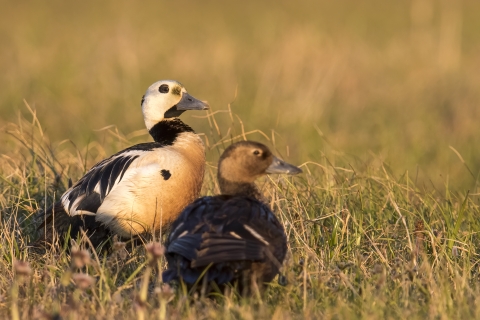The Service’s Science Leadership Award recognizes supervisors who empower staff to accomplish scientific work and champion the use of science in conservation decision-making
Neesha Stellrecht—who leads the Northern Alaska Fish and Wildlife Conservation Office’s Endangered Species Recovery Branch—is recognized specifically for her work with staff on Steller’s and spectacled eiders, which are both listed under the Endangered Species Act. Under Neesha’s leadership, the Recovery Branch has made significant advances for these birds through cutting-edge research and innovation. Neesha pursued new approaches to strengthen the rigor of species status assessments, including structured decision-making, integrated population modeling. She and her staff work closely with our Service biometricians to ensure data is scientifically robust and is shared in peer-reviewed publications. Under her leadership we have a much greater understanding of the distribution of spectacled eiders in relation to changing sea ice conditions in the Bering Sea and have examined a number of methods to protect Steller’s eider nests from predation.
Another key aspect of Neesha’s work is collaboration. She continues a long history of collaborating with partners and communities to keep toxic lead out of important waterfowl breeding/hunting areas. The Service, Alaska Department of Fish and Game, tribal health agencies and other partners use shot clinics and exchanges, informative letters, public service announcements, newspaper articles, community meetings, door-to-door personal communication, and text messages to educate the public and stakeholders on this issue. This outreach has been successful; communities do not want to use lead shot. However, Service employees and community members continue to report that lead shot is available in community stores. Because lead shot is often not labeled as “lead” (in contrast to non-toxic shot labels, which clearly state materials) these toxic loads are inadvertently purchased for waterfowl hunting without the purchaser ever being aware of the mistake.
Neesha and her team plan to continue their community engagement efforts to understand the science of eiders and conserve these birds and the lives they nourish.




